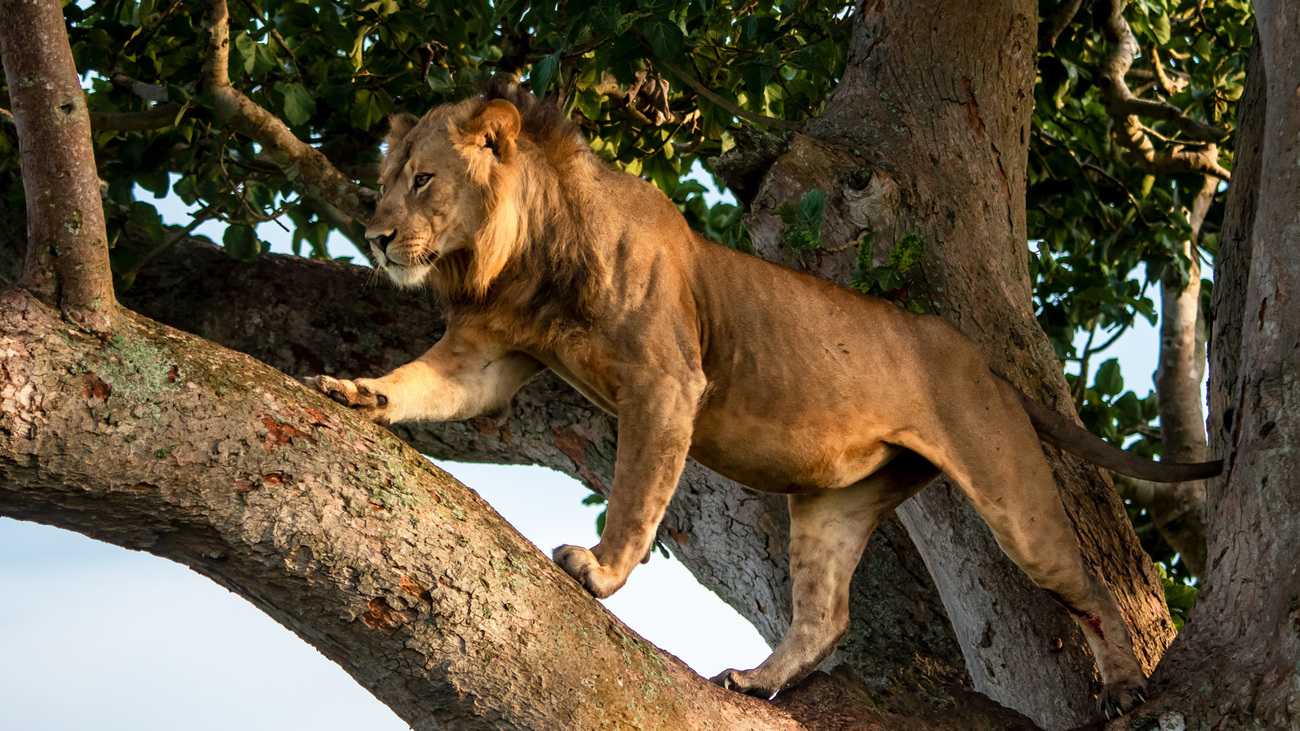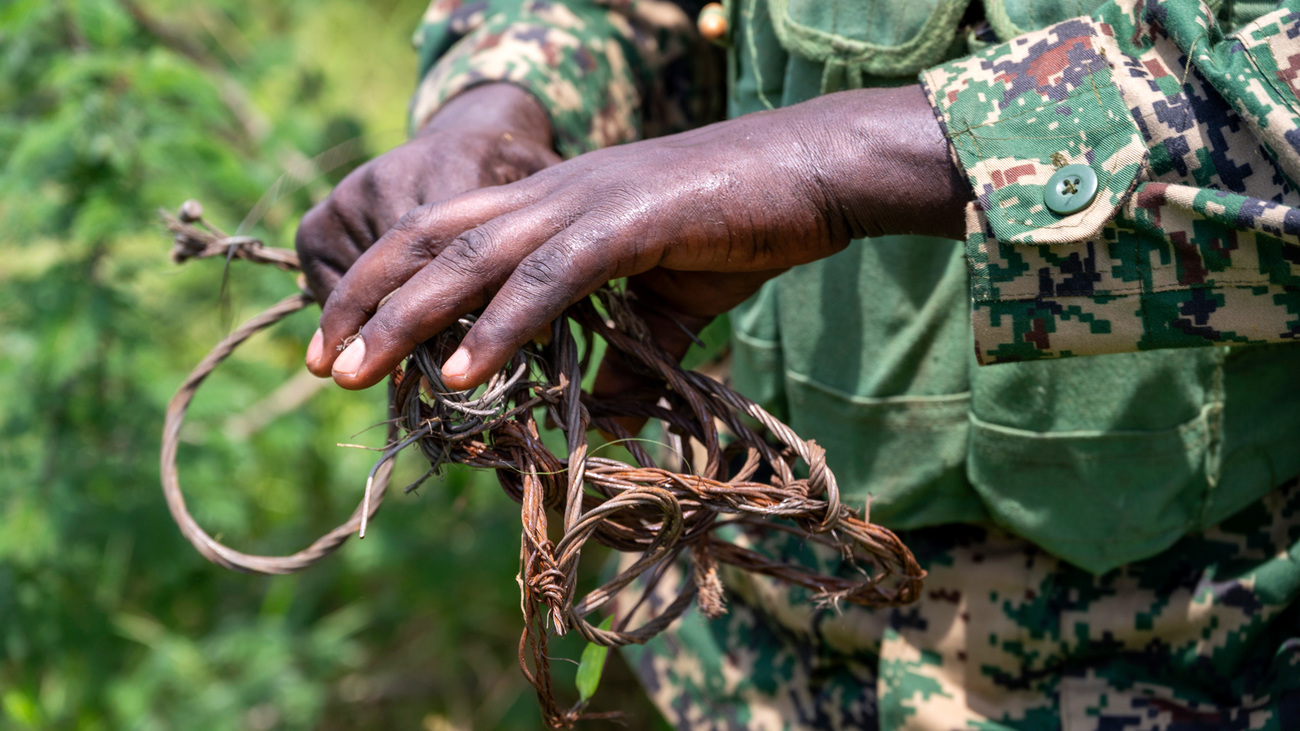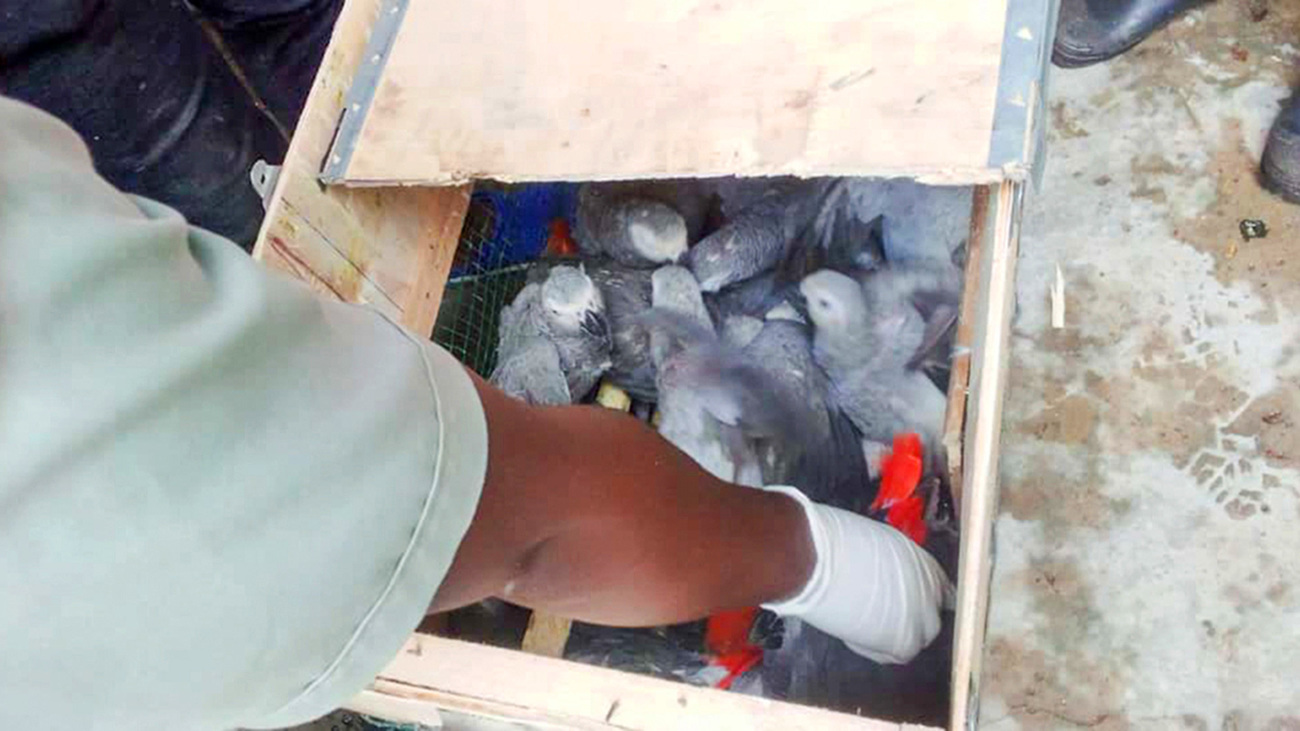Combating illegal wildlife trade - Greater Virunga Landscape
Strengthening community participation across bordershow volunteers are fighting wildlife crime in Uganda and DRC
how volunteers are fighting wildlife crime in Uganda and DRC

In March 2021, the driver of a wildlife tour company saw vultures circling over the bush in Uganda’s Queen Elizabeth National Park. He wandered off track to investigate, thinking a lion must have killed something. Instead, he found six lions dead, dismembered, and decaying.
They had been poisoned by poachers, who stole their body parts to sell on the black market.
Queen Elizabeth National Park, with its sweeping savannahs on the eastern shore of Lake Edward, is famously home to a large number of tree-climbing lions. Listed as vulnerable on the International Union for Conservation of Nature’s Red List, lions should find safety in the park’s conservation area.
These animals also attract tourists to the park, which helps the communities living there earn an income. At a time when tourism was already hit hard by COVID, the lions’ deaths threatened not only the species and the surrounding ecosystem but also human communities.
solving the crime
Through intelligence and investigation using community sources, some of whom work with the intelligence department of the park, it was established that the lions had been poisoned by members of the community for their body parts.
Four suspects identified by community informants were arrested by law enforcement officers. When they were arrested, the suspects had lion heads, claws, and oil hidden in their houses. One also had two lion skins, 40 porcupine spikes, a hunting net, and a bullet from an AK47. Two suspects were acquitted by court, while the other two were convicted and sentenced to 7 years in prison.
One of the multiple informants who provided information is part of a group of local community members supported by IFAW to help collect and report timely information on poaching incidents. These community monitors work closely—and quietly—with the park’s intelligence unit to prevent wildlife poaching and trafficking.
becoming a wildlife protector
The community monitors’ journey to becoming wildlife protectors began in December 2020, when IFAW and Uganda Wildlife Authority identified and selected ten community members from poaching and trafficking hotspots. The organizations delivered a two-day training to give the monitors the skills and tools they needed to help protect critical ecosystems and biodiversity.
They learned how to collect information about wildlife crime and to identify vulnerable species, so they could accurately report which creatures were being killed or trafficked.
The park management was especially supportive of the initiative because the pandemic meant fewer resources to patrol the protected area. As the local eyes and ears of the wildlife-crime investigators, community volunteers now play a vital role in helping rangers carry out targeted, information-based patrols, which are both less costly and more successful.
getting the inside scoop on poachers
Moses Olinga, IFAW’s program manager for Uganda and the Horn of Africa, said: “The volunteers are key in disrupting poaching and trafficking because the people involved in wildlife crime stay in their communities, so volunteers can give accurate information.”
Some of them already had a leg-up in understanding poaching networks. Moses explained: “The volunteers got involved because they want to contribute towards conservation. Some are former poachers who survived being jailed or attacked by animals. For the years they were involved in poaching, they had no benefit they could be proud of. They felt that supporting the park has more benefits.”

The volunteers immediately started saving animals’ lives. Soon after the training, community monitors reported seeing wire snares in the park to trap big game, like hippos and buffaloes. Thanks to the timely information, rangers removed six snares and arrested a poacher just after he entered the park—before he had a chance to use the spears, panga machete, and wire snares he was carrying. As a result of the positive work of the community monitors, another two were added to the mix, bringing the current number of twelve.
dangerous duties
On the opposite shore of Lake Edward lies another extraordinary wildlife area—the Democratic Republic of the Congo’s Virunga National Park. It’s Africa’s oldest national park, most biodiverse protected area, and home to around a third of the world’s mountain gorillas.
It is also home to several militia groups, fighting a bloody conflict funded by the illegal mining, fishing, lumbering, poaching, and trafficking syndicates they control.
Tragically, rare and endangered animals mean big money, whether they are alive— such as the 122 African grey parrots that were confiscated from a trafficker around Uganda/DRC border in Kisoro in April 2022—or killed for bushmeat, skins, tusks, oils, or teeth. A litre of okapi oil, for example, is estimated to fetch up to USD$50,000 on the black market in the Democratic Republic of the Congo. An okapi skin can go for up to USD$10,000.

a war economy
Virunga National Park calls illegal resource trafficking and poaching “a war economy that is worth an estimated 170 million dollars a year.” And it costs far more than money to fight it. Over 200 of the park’s rangers have been killed in the past 20 years, as have several lawyers and justice officials. They’ve sacrificed their lives to protect the park’s wildlife, ecosystems, and communities.
IFAW’s partner IUCN NL has also trained several volunteers here. Called community sensors, they collect data on security, poaching, and other environment-related incidents. IUCN NL shares any intelligence gleaned from their weekly reports with Virunga National Park. Thanks to this and other work, the park’s security forces found and destroyed two militia camps, prevented attacks on park staff, and arrested a notorious elephant-and-hippo poacher who had escaped justice for years.
According to Moses, the volunteers say they “are both proud and apprehensive. Proud that they are contributing towards the management of the park, but also worried about their safety.”
the big picture
IFAW’s efforts to fight poaching and trafficking in the two parks are based on the understanding that although a national border separates them, they are connected by land and Lake Edward, so animals—and sometimes poachers—migrate freely across the border. Moses said: “This gene-flow between animals of the two parks facilitates the future survival of species, which is why it’s so important to protect them.”
The project, supported by the Bureau of International Narcotics and Law Enforcement Affairs (INL), has strengthened collaboration between the park managers and built the investigative, operational, and prosecutorial abilities of staff around Queen Elizabeth National Park involved in tackling wildlife crime—including these heroic community volunteers. As a result of that effort and other programs, poaching and trafficking of elephants, pangolins, and hippos has dropped significantly around the park.
Although the project officially ended in September 2022, IFAW is still supporting the community monitors in Uganda with equipment and training, quarterly meetings between the two parks to plan, analyse, and share information, and coordinated patrols along the common border.
The fight to protect wildlife and surrounding communities is far from over.
from the case files…
Volunteers’ information has led to several arrests and allowed law enforcement to seize a tremendous number of illegal wildlife products. These are just a few examples.
- November 2021: Five suspects arrested with 700kg of hippo meat and three panga machetes. They also revealed the location of an assault rifle and ammunition they used.
- 17 December 2021: A solider arrested while trying to sell hippo teeth.
- 18 December 2021: A suspect arrested with 2kg of ivory, three black-and-white colobus monkey skins, two civet-cat skins, one buffalo tail, and a buffalo horn.
- 19 December 2021: Three suspects arrested with more than 50kg of dried buffalo meat.
- 23 March 2022: Six suspects arrested with around 100 pieces of fish and six spike spears for illegal fishing in the fish-breeding zones. Illegal fishers often support poachers by telling them where they can find hippos.
- 5 February 2022: Two suspects arrested with 32 hippo teeth, a pair of buffalo horns, and suspected elephant placenta. Elephant placenta is made into soup and used in traditional medicine to promote female fertility.
- 12 March 2022: A suspect arrested with three pangolin skins and 10kg of giant forest hog meat.
- August to October 2022: Thirteen suspects arrested with two firearms and one ton of hippo meat.
Related content
Our work can’t get done without you. Please give what you can to help animals thrive.